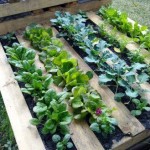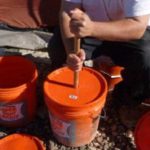Perennial Vegetables that Grow Year After Year
The majority of garden vegetables that we like to grow need to be planted fresh every year, but there are a number of varieties that can keep coming back season after season. Planting them can help to make your garden a little more efficient while giving you a reliable supply of vegetables to round out your nutritional needs. Let’s take a look at some of the more common options that you can start to incorporate into your garden this season.
Asparagus

Asparagus do not grow quickly, especially if you are planting them from seeds. However, once they take root and become established, they will grow year after year. You can also use the crowns from mature asparagus and plant them in fertile soil to produce new crops as well. It may take some time to build up a rotation of this popular vegetable, but it will be worth the wait once the ball starts rolling.
Jerusalem Artichokes

These are part of the sunflower family and have sort of a hearty, nutty flavor. They don’t resemble artichokes, rather their tubes are what you harvest and eat. They grow into tall stalks, which makes them ideal for borders, and the don’t require a lot of maintenance. To keep them coming back year after year, simply don’t harvest all of them at the end of the growing season. Leave a few intact, and they should come alive next year. In a few years, you can have a robust and steady supply on hand.
Artichokes

Regular artichokes are also perennials, but they take a long time to grow and get established. They are also not the most efficient vegetables as it takes a lot of plants to produce a good harvest. However, they are easy to manage and can thrive in a lot of different growing conditions. Artichokes are definitely worth the space they take up and the time it takes for them to grow. The trick is to be patient and wait a couple of years before you start enjoying the full benefits of a self-sustaining artichoke crop.
Kale

Kale can survive frost, snow and extreme cold before bouncing back for another growing season in the spring. Consequently, you want to make sure that you leave the plants intact after you close down your garden for the season. They grow like weeds and all you need to do is plant them once in order to enjoy their benefits year after year. Not only that, but kale is one of the most nutrient-rich vegetables in existence, which makes it ideal for survival gardening or homesteading.
Egyptian Onions

These are little onions that grown in bunches on bushy stalks. They also come back year after year as long as the mother plant remains healthy. You can either start from scratch by planting bulbs, or you may be able to find a starter bush in a local nursery. Once they get established, they should produce a horde of tiny onions that will be more than enough for you and your family.
Garlic and shallots, which are technically onions, are also excellent perennials. They are also easy to plant. Just take one of the bulbs, plant them and wait for them to grow. As long as you don’t harvest all of them, and some are left behind, they will keep coming back year after year. Keep in mind that you really want a good supply of garlic in your garden. Their health benefits, especially for their antibiotic, blood-pressure regulating and detoxifying properties are an essential component of any survival or homesteading diet.
This is by no means an exhaustive list of veggies that will come back year after year as long as you take care of the plants properly. Dedicate a portion of your garden to perennials, and you will find yourself doing a lot less work every season while enjoying the health benefits of having a wider range of options to choose from. This is particularly important when facing a SHTF situation when you may not have access to basic vegetables on an annual basis. Consider them a nutritional insurance policy that pays big dividends long after they are planted.














